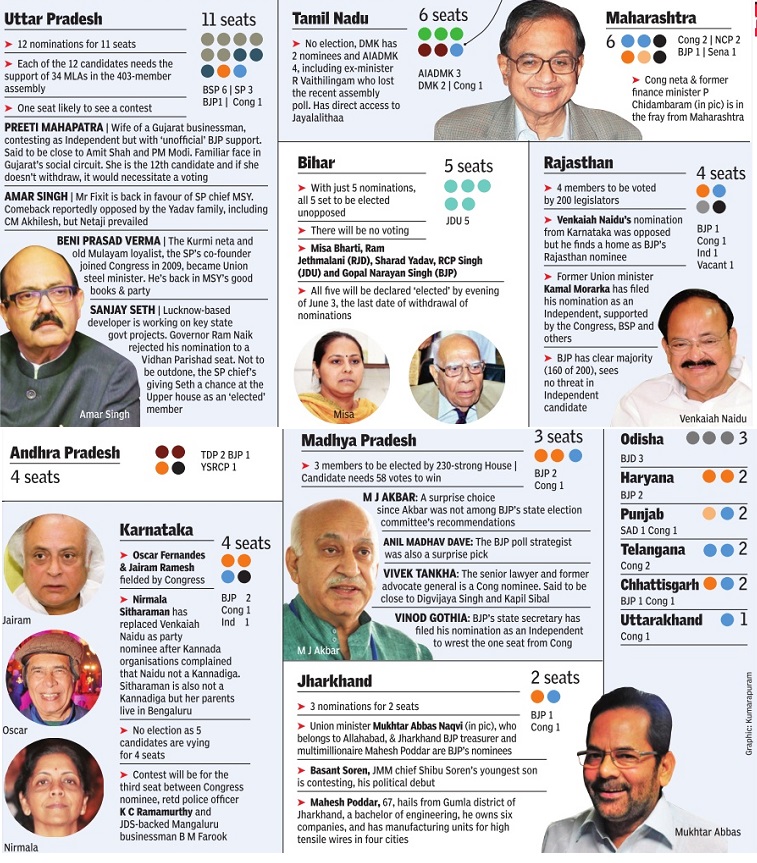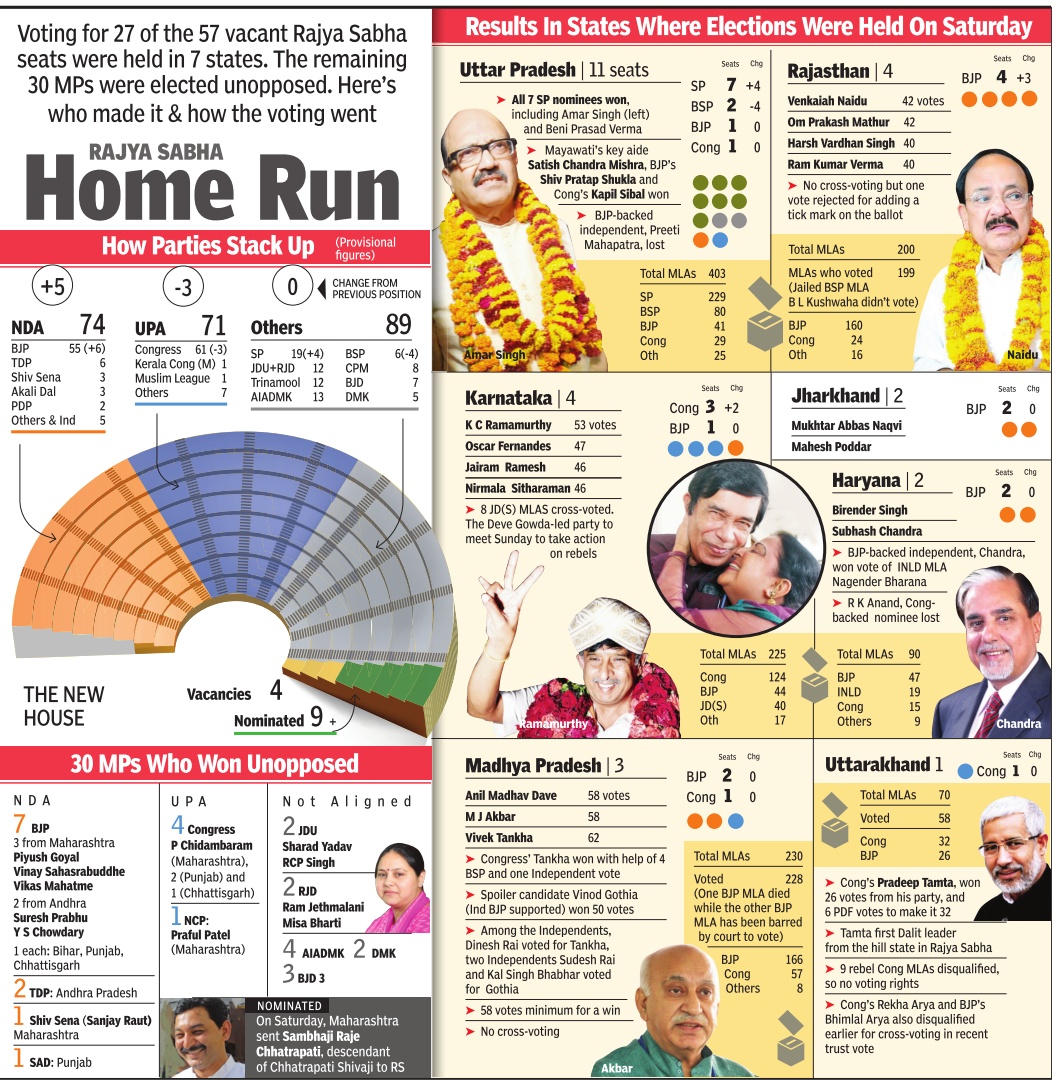Rajya Sabha
| Line 3: | Line 3: | ||
[[File: The distribution of Rajya Sabha seats, state-wise.jpg| The distribution of Rajya Sabha seats, state-wise; Graphic courtesy: [http://epaperbeta.timesofindia.com/Gallery.aspx?id=02_06_2016_016_015_002&type=P&artUrl=Rajya-Race-02062016016015&eid=31808 ''The Times of India''], June 2, 2016|frame|500px]] | [[File: The distribution of Rajya Sabha seats, state-wise.jpg| The distribution of Rajya Sabha seats, state-wise; Graphic courtesy: [http://epaperbeta.timesofindia.com/Gallery.aspx?id=02_06_2016_016_015_002&type=P&artUrl=Rajya-Race-02062016016015&eid=31808 ''The Times of India''], June 2, 2016|frame|500px]] | ||
| + | [[File: The strength of the various political parties in the Rajya Sabha on 1 June 2016.jpg| The strength of the various political parties in the Rajya Sabha on 1 June 2016; Graphic courtesy: Graphic courtesy: [http://epaperbeta.timesofindia.com/Gallery.aspx?id=02_06_2016_016_015_002&type=P&artUrl=Rajya-Race-02062016016015&eid=31808 ''The Times of India''], June 2, 2016|frame|500px]] | ||
{| Class="wikitable" | {| Class="wikitable" | ||
Revision as of 13:00, 17 August 2016



This is a collection of articles archived for the excellence of their content. |
Contents |
2014
Winter: 2014
RS completes only 21% of business during winter-2014 session
The Times of India Dec 21 2014
The logjam over the conversion row that has ensured little work was transacted in the Rajya Sabha this week which has brought down productivity in the House to a measly 21%. In comparison, Lok Sabha transacted 105% of the legislative business that was planned.
Analysis by PRS Legislative Research revealed that while Lok Sabha functioned smoothly during Question Hour with nearly 20 questions being answered in this week, Rajya Sabha functioned only 1% of the allotted time with only two questions being answered.
Despite the poor performance in the Upper House the Modi government has little choice but to cool its heels till 2016 when a significant number of opposition members—73---retire. Of the 241 members in the Rajya Sabha, 68 belong to Congress as compared to BJP's 42.
Rajya Sabha worked for 59% of winter session
Dec 24 2014
Himanshi Dhawan
The Rajya Sabha worked for 59% of the time. In 15 of the 22 days, less than three minutes were spent in responding to members' questions in the House. BJP’s low numbers in the RS have led to a near impasse in the last two weeks of the session in December, 2014.
Retirements: 2014-2020
While 10 members each retire in the next two years, it is only in 2016 that there will be any dent in the opposition numbers. Among opposition members 21 Congress members, six from BSP, five from JD (U), three each from CPM and SP and two from NCP will retire in 2016. Three nominated and three independent members will also hang up their boots in the same year. Others who will retire include BJP and allies--12 from BJP, three from AIADMK, two each from TDP, Shiv Sena and SAD.
The highest number of MPs set to retire in the next two years is from Uttar Pradesh, including 10 this year, 11 in 2016 and 10 in 2018. After 2016 the highest number of retirees will be 2018 when 67 members of the RS are set to retire.
Parliamentary behaviour
Etiquette towards women
Mar 23 2015
Dhananjay Mahapatra
In a BBC documentary on the Nirbhaya case, two advocates forgot lessons from their noble profession and blurted out their obscurantist views on women.Civil society roundly condemned them. Women lawyers have moved the Supreme Court seeking appropriate punishment for them. The controversy had hardly died down when JD(U) president Sharad Yadav, in Rajya Sabha, spoke in a derogatory tone about south Indian women. As a member of the House of Elders, a known Lohia follower and a lawmaker, a responsibility was cast on him not to lower the dignity of women. Only he can answer why he made the anti-women statement during a an insurance bill discussion. His comments were in no way an insurance to maintaining dignity of women in the country . It evoked protests from DMK MP Kanimozhi.She was made to sit down by House members , who were cackling at Yadav's ludicrous description of south Indian women. Yadav did not realize the gravity of his utterance and repeated it the next day in the House.
This time, HRD minister Smriti Irani stood up and lodged a strong protest. Yadav challenged her to a debate, reiterating that he had not said anything wrong. This meant he believed in the correctness of his pathetic comments.When Irani reminded him about the harm his comments were causing to women's dignity in general, an unrepentant Yadav mockingly told her “I know what you are.“
He actually meant to tell her “you know who I am“ and silence her with his political weight. Absence of support from the “el ders“, which included Irani's colleagues in the Cabinet, emboldened him to challenge her in an unpleasant way . Did he not deserve to be censured by the House of Elders, members of which are regarded as the Parliament's conscience keepers ? Can there be two standards one for commoners and another for MPs when it comes to censuring one for derogatory comments on women? Only after finance minister Arun Jaitley sought a clarification two days later did Yadav express “regret“ without tendering an apology . Yadav had recently taken the lead in gathering signatures of MPs in RS to move a motion for removal of a MP HC judge for alleged sexual harassment of a judicial officer. Forgetting that act of his, he spoke in a crude manner on women in Parliament.
Did he understand that his comments made a huge dent in his standing as an MP? Did RS members realize their complicit reaction to Yadav's comments dented the dignity of women as a whole? There cannot be two standards when it comes to punishing people who make public assault on dignity of women through their utterances. If civil society condemned the two advocates, the House of Elders should have taken appropriate action against Yadav to assure women that it will not tolerate any misdemeanour against them.Similar double standards was shown by Maharashtra when it banned dance bars. It had told the SC that similar dance performances in exclusive, high-society clubs would not evoke sexual arousal of male audience as opposed to the male audience frequenting the banned establishments meant for lower classes having lesser income at their disposal.
Rejecting the logic, the SC in July 2013 in Maharashtra vs Indian Hotel and Restaurant Association case had ridiculed the Maharashtra government and said, “How is it possible that enjoyment of same kind of entertainment by the upper classes leads only to mere enjoyment and in the case of poor classes, it would lead to immorality, decadence and depravity? Morality and depravity cannot be pigeon-holed by degrees depending upon the classes of audience.“
In a country governed by rule of law, we cannot allow pigeon-holing of our reaction for the same offence. The two lawyers are facing showcause notice from Bar Council of India. The outcome of proceedings could result in cancellation of licences. Why can't similar action be initiated against Yadav? If Yadav can take a lead in stalling the proposed legislation on land acquisition, he should also know the art of stalling his tongue when it is about to give away his bias against women. Moreover, as a lawmaker, he would have surely read the SC's January 1999 judgment in Apparel Export Promotion Council case.The SC had referred to the Convention on Elimination of all forms of Discrimination against Women (CEDAW), 1979 and the Beijing Declaration. The court had said, “These international instruments cast an obligation on the Indian state to gender sensitize its laws and the courts are under an obligation to see that the message of international instruments is not allowed to be drowned.“ Though Parliament had commenced gender sensitization of the laws, it must begin a similar exercise for the MPs.
2016

